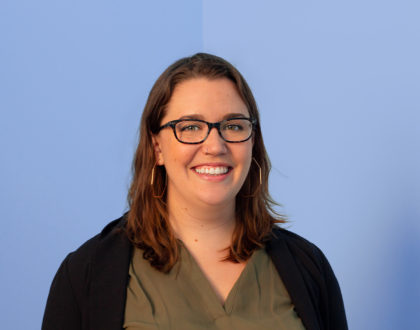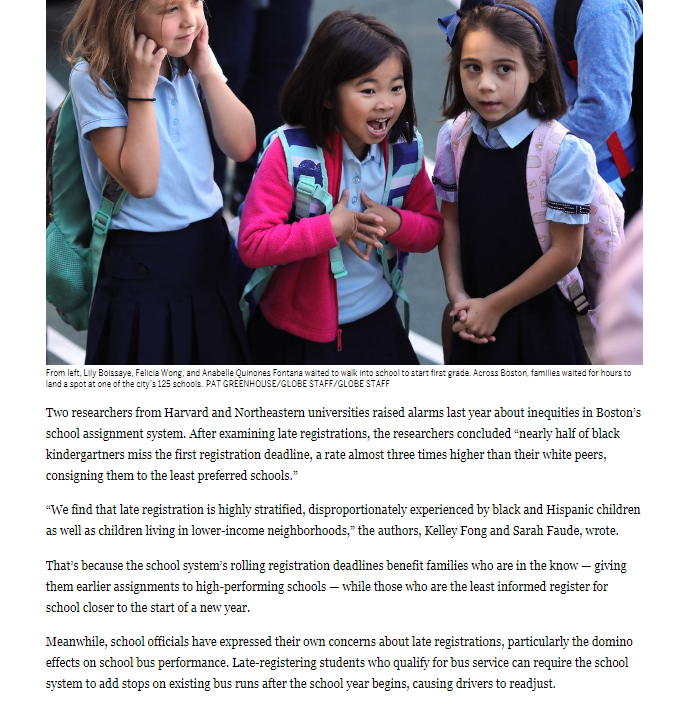Director of Research and Evaluation Sarah Faude’s superpower is sitting in the mundane

Sarah Faude, Ph.D., YW Boston’s Director of Research and Evaluation, refers to her superpower as the “ability to sit in the mundane.” That does not mean that she is mundane, but rather that she finds sociological significance in examining everyday activities. On September 5, 2019, Sarah’s research on school registration was featured in The Boston Globe article, “Late registrations complicate the start of school for many Boston families.” While working toward her Ph.D. at Northeastern University, Sarah, in partnership with Kelley Fong at Harvard University, published the article “Timing Is Everything: Late Registration and Stratified Access to School Choice.” In the article, they found that Boston Public Schools’ early registration deadlines disproportionately disadvantaged Black and Latinx students.
Sarah’s background in qualitative research and school disparities makes her a key player in YW Boston’s work to create more inclusive environments in Boston. Take a look into Sarah’s research, her expertise, and how she is transforming our diversity, equity, and inclusion work.
How school registration perpetuates inequities
Boston Public Schools operates an extensive system of school choice, in which families rank the schools their students wish to attend. All families are required to participate in this complicated, timed process, and ultimately, there are not enough high quality schools to serve every student. Sarah Faude’s research, featured in The Boston Globe, discovered that “early registration deadlines for Boston’s school choice program tended to trip up black, Hispanic, and low-income families” (ChalkTalk). To learn this information, Sarah and Kelley spent many hours visiting locations where families registered their students after the registration process’ priority deadline had already passed. They observed the late registration system and spoke with staff, who shared how difficult it was to help families who faced long lines and limited choices. Sarah and Kelley looked into the conditions that shaped who showed up late, finding that many families were late due to a recent move. Others did not know about the deadlines, were too busy, or had been counting on alternatives to district schools, such as parochial or charter schools. They also found that, “83% percent of white students went through round one, compared to just 60% of Hispanic students and 53% of black students,” with 5% of white students participating in late registration, compared to 13% of Hispanic students and 16% of black students. Those who register late are less likely to have the option of choosing a school deemed high-quality, perpetuating educational inequities for black and Latinx students.
As The Boston Globe reported, just days before school started, Boston Public Schools “registered 157 students at four registration sites, completed 137 student transfers, and processed 141 student address changes.” While the system is set up for “choice,” many late registers found that most schools were full and that they had severely limited schools to choose between. Sarah and Kelley found that the registration system was set up to benefit families who had access to the necessary information and experienced stability at home. By zoning in on the seemingly small, mundane task of registering for school, they found a key component in education inequity.

How does one find meaning in the mundane?
We may dismiss mundane tasks as boring, necessary items on our to-do list, but it is precisely these actions that our reinforce our beliefs, biases, and systems. That is why Sarah Faude is so fascinated at looking into these tasks — to see how they perpetuate societal inequities.
Sarah describes in her dissertation, The Road to Registration: Bureaucracy, Inequalities, and the Paradox of Compulsory Choice, that while “The educational climate of today is no longer characterized by images of individuals hurling racial epithets and rocks at children of color…racial inequality not only exists but thrives.” Large policy changes matter, but they “are only one part of the complex web of interlocking systems that produce and sustain segregation today.” To see how educational inequities persist, we must look at every detail, including the seemingly inconsequential daily tasks. Her dissertation looks at all of the ways bureaucracy entangles the school registration system, and how that affects students.
These mundane activities have the ability to hinder more than the school system — they show up in our communities and in our workplaces. Discrimination and segregation plague offices, especially C-suites. Prejudice is less likely to show up as the overt exclusion of the twentieth century. It is more likely to play out subtly, through inequitable hiring practices, prejudicial relationships, promotion policies, and more. As organizations seek to become more inclusive, they often try to find ways to overhaul and fix their culture or fix their policies. In doing so, they may fail to identify and fix mundane activities and processes that keep inequities in the bones of the workplace.
With this superpower, Sarah is helping YW Boston change institutional practices
After earning her Ph.D., Sarah brought her research skills to YW Boston as Director of Research and Evaluation. While YW Boston does not directly work on school choice, Sarah’s mission in her previous work aligns with the organization’s mission to eliminate racism and empower women. She continues to work toward school equity — YW Boston works with middle school girls of color in our F.Y.R.E. Initiative, and our Advocacy Committee seeks to disrupt the school-to-prison pipeline.
Sarah’s work is especially helpful as our InclusionBoston program expands its research and reach. InclusionBoston helps organizations create necessary cultural shifts to support inclusive policies and practices. We know that mundane, everyday practices can have a large impact on the inclusiveness of an office. InclusionBoston tailors its program structure to each organization’s needs. Staff meet with the organization to gather context and administer a pre-assessment tool to the organization’s staff to get a clear sense of the office climate. Through this pre-assessment and expertly facilitated conversations with staff, YW Boston assists the organization in creating an action plan to drive change in their office. It is through this action plan that organizations identify and tackle the mundane systems that prevent equity in their offices.
With her commitment to social justice research, Sarah Faude helps YW Boston better serve our partner organizations. Her experience in research helps the InclusionBoston team examine the knowledge, attitudes, and behaviors unique to each office and develop a dialogue series to meet their needs. As we work with organizations, Sarah gathers research on the most common pitfalls that organizations face, and how to address them. Many organizations seek monumental, widespread change when they engage in diversity, equity, and inclusion work. Sarah’s superpower reminds us that this begins by looking at the seemingly smallest details and finding meaning.
______
About InclusionBoston
InclusionBoston advances diversity, equity, and inclusion by partnering with organizations looking for improved business results. Using our advanced assessment tool and the latest research on behavioral and organizational change, we partner with organizations to create an action plan and provide them with the resources needed to drive lasting change. Our customized, evidence-based approach builds internal capacity and promotes cultural change while supporting organizations throughout their journey.
DE&I Workshops: YW Boston also offers one-day workshops where participants explore frameworks, develop knowledge, and engage in dialogue.
Ready to unlock the power of diversity in the workplace? Click here to learn more about InclusionBoston and request your free consultation.
